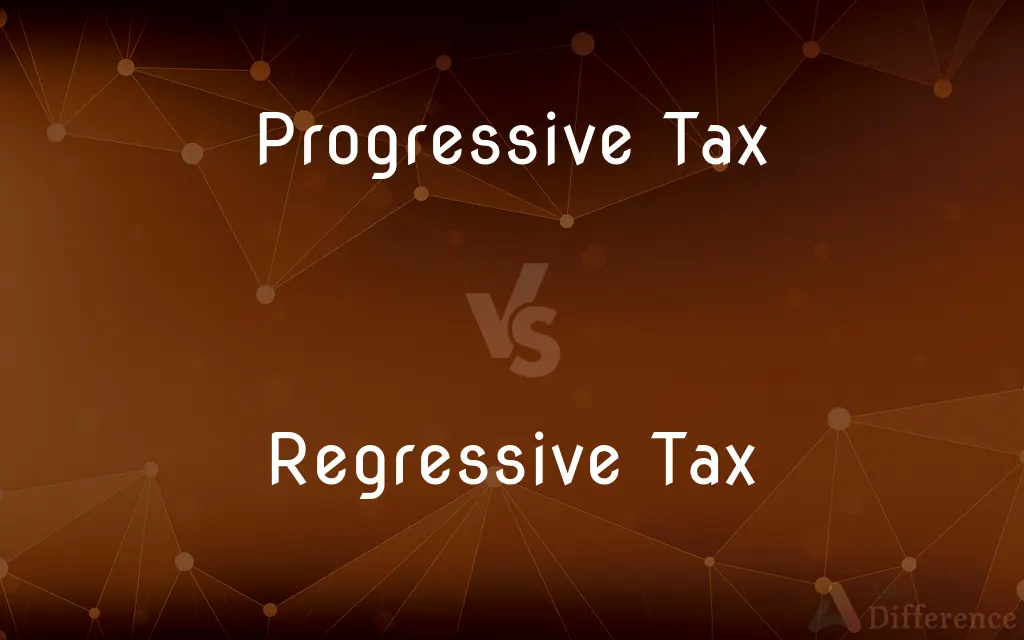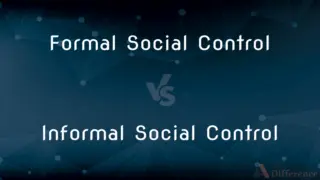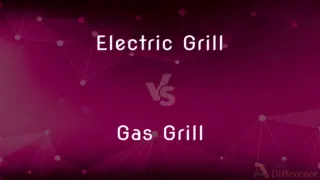Progressive Tax vs. Regressive Tax — What's the Difference?
By Tayyaba Rehman — Published on October 15, 2023
Progressive Tax takes a larger percentage from high-income earners, while Regressive Tax takes a larger percentage from low-income earners.

Difference Between Progressive Tax and Regressive Tax
Table of Contents
ADVERTISEMENT
Key Differences
Progressive Tax and Regressive Tax are distinct taxation systems that affect income groups differently. A Progressive Tax system is characterized by its increasing tax rates as income rises. As individuals or entities earn more, they are subjected to higher tax rates, ensuring that those with greater means contribute a more significant proportion of their income.
In contrast, a Regressive Tax system imposes a higher tax burden relative to income on those with lower earnings. This means that as a percentage of their income, lower-income individuals pay more than those with higher incomes. Such a system can be seen as less equitable since it places a heavier relative burden on those less able to afford it.
The intention behind a Progressive Tax system is often to achieve wealth redistribution or at least mitigate income inequality. By ensuring that the wealthy pay a larger share of their income, it aims to balance the economic disparities in society.
On the other hand, proponents of Regressive Tax systems might argue that such taxes are simpler and more efficient. However, critics contend that they disproportionately affect and disadvantage the economically vulnerable.
Ultimately, both Progressive Tax and Regressive Tax systems have their advocates and detractors. The choice between them often hinges on economic philosophies and goals of fairness and equity.Progressive Tax and Regressive Tax are distinct taxation systems that affect income groups differently. A Progressive Tax system is characterized by its increasing tax rates as income rises. As individuals or entities earn more, they are subjected to higher tax rates, ensuring that those with greater means contribute a more significant proportion of their income.
ADVERTISEMENT
Ultimately, both Progressive Tax and Regressive Tax systems have their advocates and detractors. The choice between them often hinges on economic philosophies and goals of fairness and equity.
Comparison Chart
Definition
Tax rate increases with income
Tax rate decreases as income increases
Impact on Low-Income
Pays a smaller percentage of income
Pays a larger percentage of income
Impact on High-Income
Pays a larger percentage of income
Pays a smaller percentage of income
Equity
Seen as more equitable
Often seen as less equitable
Typical Examples
Income taxes with multiple brackets
Sales taxes, flat taxes
Compare with Definitions
Progressive Tax
Taxation that aims to reduce income inequality.
Many nations adopt Progressive Tax to achieve a fairer wealth distribution.
Regressive Tax
A levy where the tax rate falls as the taxable amount increases.
In some nations, certain indirect taxes are Regressive Tax mechanisms.
Progressive Tax
A tax system where the tax rate rises as the taxable amount increases.
In the Progressive Tax system, billionaires pay a higher rate than average workers.
Regressive Tax
A tax system where higher incomes benefit from relatively lower rates.
Under Regressive Tax, the millionaire and the average worker might pay the same tax rate on certain goods.
Progressive Tax
A mechanism where higher incomes face steeper tax rates.
Under the Progressive Tax, Jane's higher earnings put her in a 30% bracket.
Regressive Tax
A system where tax burdens decrease as one earns more.
The flat tax proposal was criticized as being a Regressive Tax for the poor.
Progressive Tax
A tax designed to take a larger percentage from the wealthy.
The Progressive Tax ensures that top earners contribute more to public funds.
Regressive Tax
Taxation that's proportionally harder on the economically vulnerable.
With Regressive Tax, those on minimum wage might find it tougher to manage expenses.
Progressive Tax
A levy that becomes more burdensome as income rises.
Thanks to Progressive Tax, Mark, earning $1 million, pays a 35% rate.
Regressive Tax
A tax taking a larger percentage from those with lower incomes.
A sales tax is often viewed as a Regressive Tax since everyone pays the same rate regardless of income.
Common Curiosities
What's the core principle of Progressive Tax?
Progressive Tax is based on the principle that higher earners should pay a larger percentage of their income in taxes.
How does Regressive Tax impact lower-income individuals?
Regressive Tax places a proportionally heavier burden on lower-income individuals than on higher earners.
Why do some favor Progressive Tax systems?
Advocates believe Progressive Tax promotes fairness and helps reduce income inequality.
How do countries decide between Progressive and Regressive Tax systems?
It often depends on economic philosophies, goals of fairness, and political decisions.
Is Progressive Tax always beneficial for low earners?
Typically, yes. Lower earners generally pay a smaller percentage of their income under Progressive Tax systems.
Can a tax system be both Progressive and Regressive?
A country can have elements of both, like a progressive income tax but regressive sales taxes.
Do any countries solely use Regressive Tax systems?
Most countries use a mix, but some heavily rely on taxes that have regressive effects.
What's a common example of a Regressive Tax?
Sales taxes are often cited as examples since everyone pays the same rate regardless of income.
How do Progressive Tax systems impact wealth distribution?
Progressive Tax can lead to wealth redistribution by taking more from the rich and benefiting public services.
Are flat taxes considered Regressive Tax?
Often, yes. Flat taxes charge everyone the same rate, which can be regressive in effect.
How do taxpayers perceive Progressive Tax?
Views vary. Some see it as fair, while others feel it penalizes success.
Do all countries have Progressive Tax on income?
No, while many do, tax structures vary globally.
How does Regressive Tax affect income inequality?
Regressive Tax can exacerbate income inequality since it burdens lower earners more.
Are there any benefits to Regressive Tax?
Proponents argue they're simpler and more efficient, but critics point out their equity concerns.
What's the effect of Regressive Tax on consumption?
It might reduce consumption among lower earners as they bear a heavier relative tax burden.
Share Your Discovery

Previous Comparison
Formal Social Control vs. Informal Social Control
Next Comparison
Electric Grill vs. Gas GrillAuthor Spotlight
Written by
Tayyaba RehmanTayyaba Rehman is a distinguished writer, currently serving as a primary contributor to askdifference.com. As a researcher in semantics and etymology, Tayyaba's passion for the complexity of languages and their distinctions has found a perfect home on the platform. Tayyaba delves into the intricacies of language, distinguishing between commonly confused words and phrases, thereby providing clarity for readers worldwide.













































